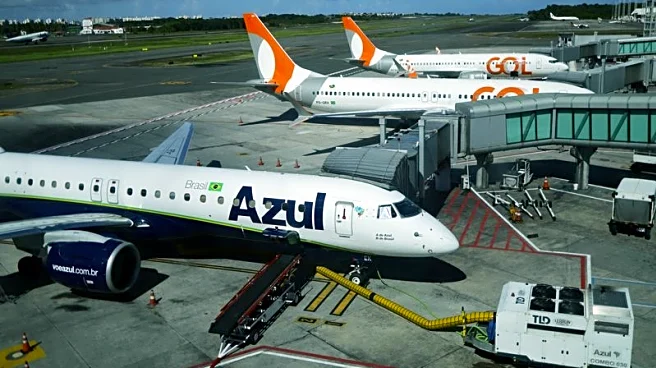By Gabriel Araujo and Luciana Magalhaes
SAO PAULO (Reuters) -Airline group Abra has decided to terminate talks on a potential merger between Brazilian carrier Gol, which it controls, and rival Azul, a securities filing showed late on Thursday.
The move ends prospects for the creation of a dominant airline in Latin America's largest economy, which would have held roughly 60% of the domestic market, surpassing the local unit of Chile-based LATAM Airlines.
Abra Group - the majority investor in Gol and
Colombia's Avianca - and Azul first signed a memorandum of understanding in January aimed at combining the two carriers, following months of talks and market speculation.
However, Azul filed for Chapter 11 bankruptcy protection in May, a move that analysts warned at the time would likely scupper the potential merger with Gol, which in June emerged from its own bankruptcy proceedings.
INDUSTRY STRUGGLES
"The parties have not meaningfully discussed or progressed a possible business combination transaction for several months as a result of Azul's focus on its Chapter 11 proceeding," Abra told Azul in a letter, according to Gol's filing.
Both companies sought bankruptcy protection as the industry grappled with debt burdens, a steep decline in traffic during the COVID-19 pandemic, and aircraft delivery delays.
Abra noted that the January memorandum came "in another scenario and at another moment for the companies."
Gol and Azul also terminated their 2024 codeshare deal for cross-selling tickets and integrating their loyalty programs, which had been under intense scrutiny from antitrust watchdog CADE.
COMPETITION CONCERNS
Abra, however, left the door open for future talks.
"We continue to believe in the merits of a business combination of Azul and Gol and, as such, Abra is ready, willing and available to engage with the relevant stakeholders," it said.
In a separate filing, Azul confirmed the talks had ended and reaffirmed its "commitment to strengthening its capital structure." Azul expects to exit bankruptcy in early 2026.
The potential merger had raised competition concerns and criticism from LATAM, though some experts labeled it a "necessary evil" for a financially healthy sector in Brazil, where costs are high and air travel remains restricted.
Brazil's government, which initially supported the deal to prevent either company from failing but later reversed its stance on competition worries, welcomed the end of the talks.
"The outcome is the result of the strengthening of the airlines and the growth of aviation in Brazil," Ports and Airports Minister Silvio Costa Filho wrote on X.
(Reporting by Gabriel Araujo and Luciana Magalhaes; Editing Jacqueline Wong, Kirsten Donovan)
















